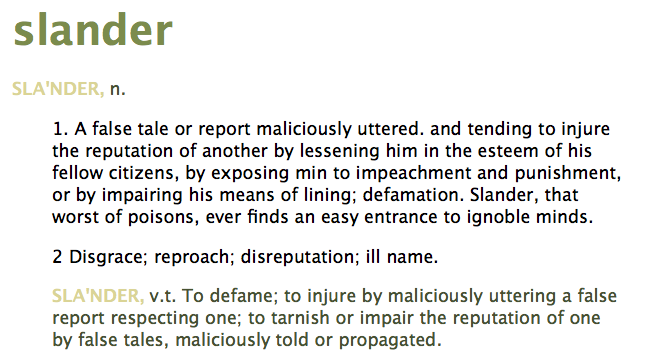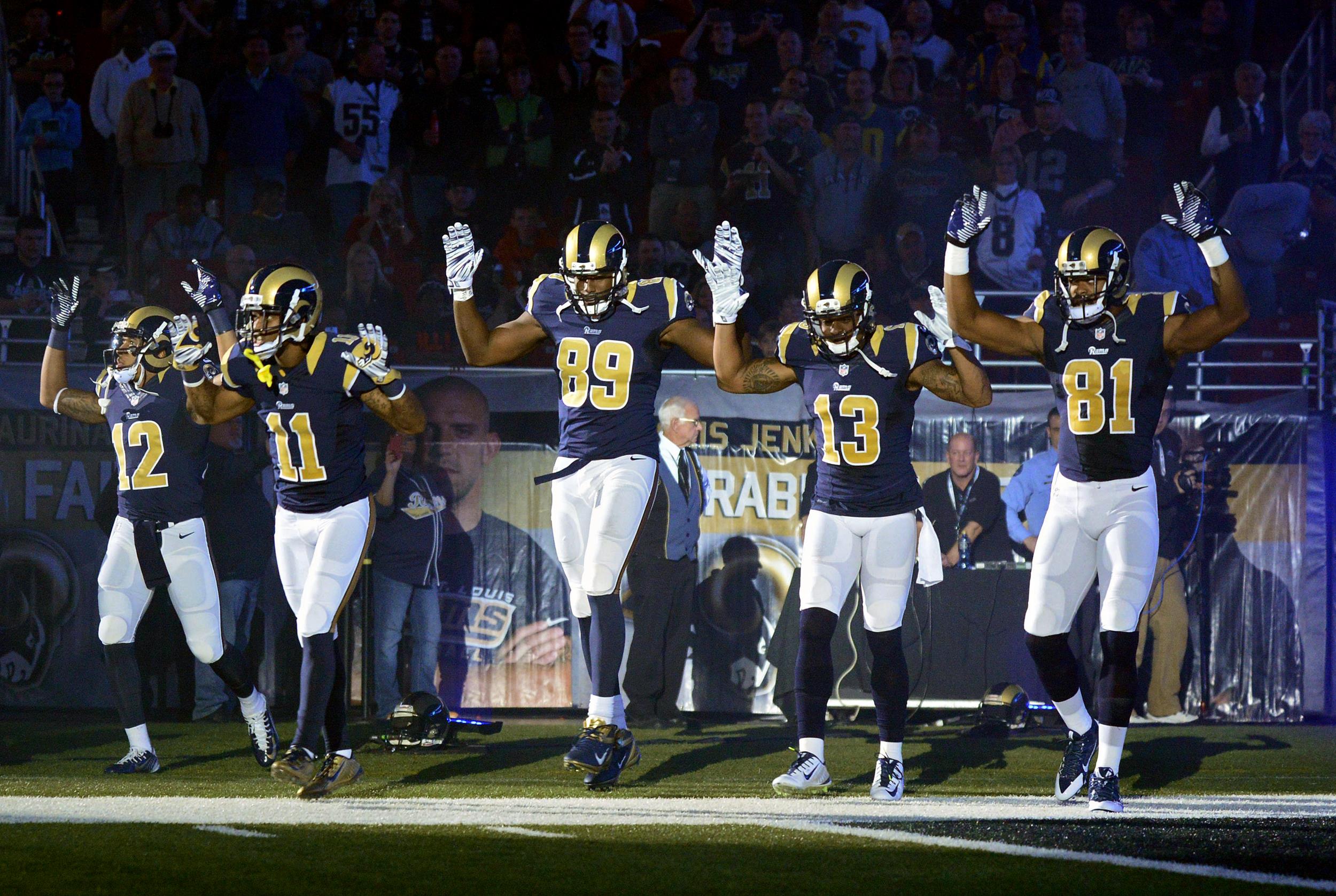What is slander?
Noah Webster defined the word in his incomparable 1828 dictionary.

“Slander, that worst of poisons, ever finds an easy entrance to ignoble minds.”
To slander another person or group of persons is to speak falsely about them in a way that tarnishes their reputation. For sinful man, such malicious speech is far too smoothly flowing from the tongue.
What does the New Testament say about slander?
The testimony of Scripture is quite plain. Allowed to speak for itself, it lands with the thud of a hammer blow.
For out of the heart come evil thoughts, murder, adultery, sexual immorality, theft, false witness, slander. These are what defile a person. But to eat with unwashed hands does not defile anyone.” (Matthew 15:19-20 ESV)
And he said, “What comes out of a person is what defiles him. For from within, out of the heart of man, come evil thoughts, sexual immorality, theft, murder, adultery, coveting, wickedness, deceit, sensuality, envy, slander, pride, foolishness. All these evil things come from within, and they defile a person.” (Mark 7:20-23 ESV)
And since they did not see fit to acknowledge God, God gave them up to a debased mind to do what ought not to be done. They were filled with all manner of unrighteousness, evil, covetousness, malice. They are full of envy, murder, strife, deceit, maliciousness. They are gossips, slanderers, haters of God, insolent, haughty, boastful, inventors of evil, disobedient to parents, foolish, faithless, heartless, ruthless. Though they know God’s righteous decree that those who practice such things deserve to die, they not only do them but give approval to those who practice them. (Romans 1:28-32 ESV)
And why not do evil that good may come?—as some people slanderously charge us with saying. Their condemnation is just. (Romans 3:8 ESV)
For I fear that perhaps when I come I may find you not as I wish, and that you may find me not as you wish—that perhaps there may be quarreling, jealousy, anger, hostility, slander, gossip, conceit, and disorder. (2 Corinthians 12:20 ESV)
Let all bitterness and wrath and anger and clamor and slander be put away from you, along with all malice. (Ephesians 4:31 ESV)
Put to death therefore what is earthly in you: sexual immorality, impurity, passion, evil desire, and covetousness, which is idolatry. On account of these the wrath of God is coming. In these you too once walked, when you were living in them. But now you must put them all away: anger, wrath, malice, slander, and obscene talk from your mouth. Do not lie to one another, seeing that you have put off the old self with its practices and have put on the new self, which is being renewed in knowledge after the image of its creator. (Colossians 3:5-10 ESV)
Their wives likewise must be dignified, not slanderers, but sober-minded, faithful in all things. (1 Timothy 3:11 ESV)
Besides that, they learn to be idlers, going about from house to house, and not only idlers, but also gossips and busybodies, saying what they should not. So I would have younger widows marry, bear children, manage their households, and give the adversary no occasion for slander. For some have already strayed after Satan. (1 Timothy 5:13-15 ESV)
If anyone teaches a different doctrine and does not agree with the sound words of our Lord Jesus Christ and the teaching that accords with godliness, he is puffed up with conceit and understands nothing. He has an unhealthy craving for controversy and for quarrels about words, which produce envy, dissension, slander, evil suspicions, and constant friction among people who are depraved in mind and deprived of the truth, imagining that godliness is a means of gain. (1 Timothy 6:3-5 ESV)
For people will be lovers of self, lovers of money, proud, arrogant, abusive, disobedient to their parents, ungrateful, unholy, heartless, unappeasable, slanderous, without self-control, brutal, not loving good, treacherous, reckless, swollen with conceit, lovers of pleasure rather than lovers of God, having the appearance of godliness, but denying its power. Avoid such people. (2 Timothy 3:2-5 ESV)
Older women likewise are to be reverent in behavior, not slanderers or slaves to much wine. They are to teach what is good, (Titus 2:3 ESV)
So put away all malice and all deceit and hypocrisy and envy and all slander. (1 Peter 2:1 ESV)
Slander is behavior from the realm of Adam, the kingdom of darkness. Slander is defiling and deserving of death. Slander is not to be named among the brethren, put away from the Christian with the violent hatred he is to have for all his wretched sin.
Is slander ever justified?
What if you are genuinely afraid, or sad, or angry? No.
What if it is considered compassionate, empathetic, or understanding by most of the people you know? No.
Where the battle rages the most, there the loyalty of the soldier is tested. If your allegiance to Christ is only active when convenient, you are not loyal to Christ. The Christian is not free to disobey his King when he especially wants to, feels like it, or even when he will be the recipient of praise by others.
What is one contemporary application of this truth, that the Christian is never to slander another individual or group?
Particularly over the last few years, beginning with the Trayvon Martin incident, major media outlets have put out as headline news the fatal shootings of black men. In cities across the country the response to these stories has been fear and anger by many people. The two most recent incidents to cause nationwide protests, demonstrations, and riots were the shootings by police of Alton Sterling, in Baton Rouge, and Philando Castile, in Falcon Heights.
Christians have the opportunity to respond to each event and to the broader narrative, that black men are targeted with lethal effect by police departments in America. Our hatred of slander should impact both responses.
Regarding each event, the mature Christian man should not speak as if injustice has been perpetrated by police until investigations have produced reliable information. Unfortunately, in our immaturity and hastiness to speak, Christians have too often publicly spoken against the police, slandering individual officers by claiming they have done wrong, only for it to be shown that no wrongdoing had occurred.
Michael Brown provides us with the most prominent case study. Shot and killed by Darren Wilson, a cop in Ferguson, MO, there were many Christians who angrily decried Wilson’s racist, over-the-top use of force against Brown. They mourned that an innocent, gentle giant had been shot, though he’d had his hands up, simply because he was a young black man under the 9 millimeter gaze of a racist cop. But then the truth came out. Michael Brown was no innocent, gentle giant. He had violently attacked Darren Wilson; and Officer Wilson had used his firearm in defense. We intentionally train officers to behave in this way. We pay taxes so that officers will have guns loaded with real bullets so they can go home to their families alive at the end of their shifts. Those Christians who had wisely waited to pass judgement until after a proper investigation were spared of having publicly slandered a public servant. Those who had not so waited were shown to be guilty of speaking falsely and damagingly of another. Wilson’s reputation was run through manure. Sadly, most of the prominent Christian men who had so loudly slandered Wilson have not equally loudly repented, taken their words back, or sought to restore his reputation.
Does this provide us with a lesson for how we should carry ourselves in the cases of Sterling and Castile, and any that may come in the future? We should wait to pass judgement. We should only condemn men of wrongdoing if and when it is shown that wrongdoing was done. And we should encourage our brothers and sisters in the faith to act in kind.
Well, what about the broader narrative that we so commonly hear, and basically assume to be true, that blacks are victims of police brutality because of institutional racism?
Because that narrative is not true, it is slanderous of Christians to affirm it with our speech.
Now, my assumption is that many disagree with the above statement. So, let me try to establish its truth with some fact telling.
What do you think about this 5 minute video from Larry Elder with Prager University? He has also written this pointedly relevant article.
In this video, Elder is interviewed by Dave Rubin of The Rubin Report. Dave Rubin is not a conservative.
In this article, Aaron Bandler of The Daily Wire reports on 7 statistics that show that systemic racism does not exist in policing. As a connected piece, this article from Bandler inspects 5 facts regarding blacks shot by police.
Ben Shapiro, lawyer and journalist, weighs in on the matter in this short, 10 minute video.
David French of the National Review, one of the sharpest thinkers in America today, has written this article, which doesn’t pretend that everything is perfect, but does help inoculate us from false arguments. Rich Lowry, also with the National Review, writes here with a level head.
So, if systemic racism is not a blight in America’s police force, it is slanderous, no matter what one’s individual experience with the police may be, to speak as if it is. It is slanderous of some of society’s finest men and women, who daily put their lives on the line to prevent crime in this country’s communities. Instead of our default being to condemn them, it ought to be to thank them, and their families.
Christian, let slander be put away from you. It is not becoming of the people of God. This charge is particularly important when it is hard. At a time like this, when many are charging America’s police forces with wrongdoing and racial prejudice, may Christians be those who lead the way in true speech. We are servants of the truth, those who hate falsehood (Proverbs 13:5).

